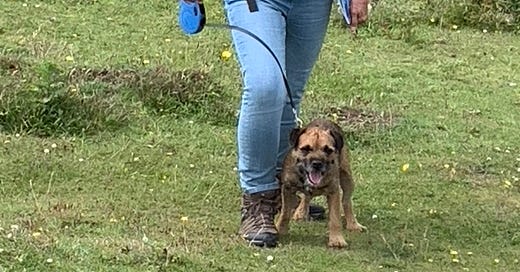My name is Gillian Richmond. I’m writing this in the UK in the autumn of 2024.
I’ve spent most of my life writing for my living. I’ve written some plays for the theatre and hundreds of scripts for radio and TV. Recently I’ve been working on a novel. More than one actually. It’s the most difficult story-telling form I’ve tried yet.
IMDB will tell you that for thirty years, between 1987 and 2017, I earned my living as a writer of popular British TV drama. IMDB records the stuff that made it to the screen, but there’s a mass of stuff IMDB doesn’t know about. The stage plays that were performed; the radio plays that were broadcast; the radio drama series I wrote for; the TV projects I was paid to develop; the writing workshops I ran; the university writing courses I taught; the writing residencies; the writing fellowship. IMDB has no idea that I’m still writing and still teaching - mentoring young writers, when they ask for help. But, although I’m not doing so much of it these days, I still think of myself as a writer of broadcast drama.
I’ve written for many different shows, but my name is associated with two in particular: The Archers on radio and EastEnders on TV. I wrote for both programmes, off and on, over a period of more than thirty years. For non-UK readers, The Archers is a radio show that has been running for over seventy years, set in a fictional village called Ambridge EastEnders, now approaching its fortieth birthday, is a continuing TV drama series that follows the lives of a group of people living in and around Albert Square in the east end of London. It exploded onto UK TV screens in 1985, and my first episode of the show was screened on BBC1 in May 1987, soon after my first episodes of The Archers went out on BBC Radio 4.
Between then and my last episode of The Archers in 2020 I wrote more Ambridge episodes than I can count, and somewhere north of one hundred and thirty episodes of EastEnders, most under my name, some under pennames. Several of the EastEnders episodes were ‘specials’ that regular viewers might remember. A two-hander in Portugal, where Phil bullied Lisa into handing him their baby: an early example of a popular drama exploring the issue of coercive control. The day of Frank Butcher’s funeral, where Peggy and Pat, ancient rivals, came to blows over which of them he’d loved the most. And the episode I’m most proud of, the one I wrote very early on, in the late eighties, when homophobia was rife, where Colin and his boyfriend Guido gave each other an affectionate goodnight peck on the lips. The tabloids next morning were purple with rage. Many years later, in 2015, a young writer, a Masters’ student in one of my classes, having Googled my name, came up to me after class and asked what all the fuss had been about. I could only agree.
We’re a mix of creatures, we writers of popular drama: a jumble of former script-editors, former producers, former actors, former market traders, and, like me, former (and occasionally current) teachers and playwrights. We work collaboratively with production teams and, if we are to survive, must learn quickly the art of compromise. A novelist friend, who liked working alone, asked me once why I did it. Well, I have kids to feed, I said, and the money’s good. And it’s a clean job and my hands remain physically (if not always metaphorically) spotless. Plus, for the most part I get to work in the warm and dry of my little room, at arm’s length from the biscuit box in the breakout area.
But what I liked most of all, what I liked a lot, was working with other people on creating shows. The huddling in windowless rooms, the laughing, the shouting, the agreeing and disagreeing, drinking too much coffee, eating too many chocolate digestives, the messy business of making up stories together. I loved the anarchy of story conferences. I loved the precision of script meetings. I loved writing my drafts. I adored witnessing directors and actors working their magic on my scripts. And when all was done, I enjoyed sitting on the sofa at home with family and friends, watching the TV as my stuff went out. I can’t imagine a more privileged way to spend a working life.
But how did you get started, students ask me.
Well, I tell them, I’ve scribbled down stories since before I can remember. Short stories, micro stories, embryonic novels, bad poems.
Yeah, yeah, they reply, us too. But how did you get your break?
In this first season of This Writer’s Journey, I’m going to tell you the story of how my breakthrough play The Last Waltz came to be first produced, and how that led to my first commissions for The Archers and EastEnders.
The plan is to publish on Thursdays. The story will last about four months.
When this part of my story finishes, I’ll take a break. If there’s sufficient interest, I hope to return in 2025 with more.
I hope you’ll want to join me.





I remember visiting the EastEnders set ahead of the first episode being shown, to interview several of the actors for Just Seventeen magazine, where I worked at the time. I found the Albert Square set fascinating!
Just found your Substack via Sharon Joslyn (Pigeon Post). Will catch up!